446 scholarly books by Seagull Books and 11
start with G
446 scholarly books by Seagull Books and 11
446 scholarly books by Seagull Books
11 start with G start with G
11 start with G start with G
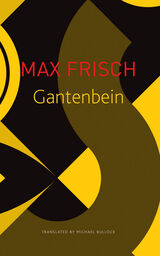
Gantenbein
Max Frisch
Seagull Books, 1965
A playfully postmodern novel exploring questions of identity from a major Swiss writer.
A man walks out of a bar and is later found dead at the wheel of his car. On the basis of a few overheard remarks and his own observations, the narrator of this novel imagines the story of this stranger, or rather two alternative stories based on two identities the narrator has invented for him, one under the name of Enderlin, the other under the name Gantenbein.
A man walks out of a bar and is later found dead at the wheel of his car. On the basis of a few overheard remarks and his own observations, the narrator of this novel imagines the story of this stranger, or rather two alternative stories based on two identities the narrator has invented for him, one under the name of Enderlin, the other under the name Gantenbein.
[more]

General Firebrand and His Red Atlas
Tathagata Bhattacharya
Seagull Books, 2024
A fast-paced and action-packed dystopian novel, addressing the nature of power, the limits of rationality, and the dominance of fear.
In a world on the brink of totalitarian rule, one man rises from the shadows to ignite a revolution and becomes the unlikely leader of a war of resistance that will shake the very foundations of power. General Firebrand, an unsocial and recovered alcoholic, considered a pariah by society, rises up against the country’s fascist regime. In this guerrilla war, Firebrand garners support from the unlikeliest allies. Beasts and birds of the jungle join the struggle. Spirits of historical figures from past wars and fictional characters with supernatural abilities lend their strength to the cause. As a devastating secret is revealed that moves Firebrand to the core, the battle for liberation takes on new dimensions, exposing the fragility of rationality and the weight of historical wrongs committed in the name of a supposedly humane ideology.
With zany, irreverent prose and a breakneck pace, General Firebrand and His Red Atlas is an explosive debut novel that challenges conventional wisdom and explores the complexities of courage, doubt, and the pursuit of justice in a world dominated by fear.
In a world on the brink of totalitarian rule, one man rises from the shadows to ignite a revolution and becomes the unlikely leader of a war of resistance that will shake the very foundations of power. General Firebrand, an unsocial and recovered alcoholic, considered a pariah by society, rises up against the country’s fascist regime. In this guerrilla war, Firebrand garners support from the unlikeliest allies. Beasts and birds of the jungle join the struggle. Spirits of historical figures from past wars and fictional characters with supernatural abilities lend their strength to the cause. As a devastating secret is revealed that moves Firebrand to the core, the battle for liberation takes on new dimensions, exposing the fragility of rationality and the weight of historical wrongs committed in the name of a supposedly humane ideology.
With zany, irreverent prose and a breakneck pace, General Firebrand and His Red Atlas is an explosive debut novel that challenges conventional wisdom and explores the complexities of courage, doubt, and the pursuit of justice in a world dominated by fear.
[more]
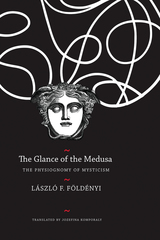
The Glance of the Medusa
The Physiognomy of Mysticism
László F. Földényi
Seagull Books, 2018
In The Glance of the Medusa, Lászó F. Földényi offers a mesmerizing examination of the rich history of European culture through the lens of mythology and philosophy. Embracing the best traditions of essay writing, this volume invites readers on a spiritual and intellectual adventure. The seven essays bear testimony to Földényi’s encyclopedic knowledge and ask whether it is possible to overcome our fear of passing away. In doing so, they illuminate moments of mystical experience viewed in a historical perspective while inviting readers to engage with such moments in the present by immersing themselves into the process of reading and thinking.
Rather than providing firm answers to burning questions, The Glance of the Medusa highlights the limits of definition, conjuring up situations in which Man partakes of unutterable experiences—such as passion, pleasure, fear, poetry, or disgust—suggesting that moments of ecstasy cannot be pinned down or captured, only drawn a little closer.
Rather than providing firm answers to burning questions, The Glance of the Medusa highlights the limits of definition, conjuring up situations in which Man partakes of unutterable experiences—such as passion, pleasure, fear, poetry, or disgust—suggesting that moments of ecstasy cannot be pinned down or captured, only drawn a little closer.
[more]
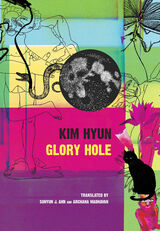
Glory Hole
Kim Hyun
Seagull Books, 2022
A ground-breaking new collection of queer poetry from a leading contemporary Korean poet.
Kim Hyun’s Glory Hole is the first Korean queer poetry collection. Featuring gay teens, elders, cats, caterpillars, robots, and other unexpected characters, Kim’s fifty-one eccentric poems trace themes of love, sexual desire, abandonment, destitution, and death. In recounting the splendid yet tragic journeys of his speakers, Kim defies meaningful sense-making. His poems are a mishmash of dystopian sci-fi and pornography, storytelling and poetry, fictive references, and real figures. They are not embellished with elegant imagery; in fact, they are antithetical to it, opting instead for incoherent tense, unidiomatic expressions, and never-ending puns. After all, like LGBTQ+ people in many cultures, Korean queers live in this site of violence. Bewilderment, deliberately, is Kim Hyun’s form. Glory Hole invites readers into a very queer world.
Kim Hyun’s Glory Hole is the first Korean queer poetry collection. Featuring gay teens, elders, cats, caterpillars, robots, and other unexpected characters, Kim’s fifty-one eccentric poems trace themes of love, sexual desire, abandonment, destitution, and death. In recounting the splendid yet tragic journeys of his speakers, Kim defies meaningful sense-making. His poems are a mishmash of dystopian sci-fi and pornography, storytelling and poetry, fictive references, and real figures. They are not embellished with elegant imagery; in fact, they are antithetical to it, opting instead for incoherent tense, unidiomatic expressions, and never-ending puns. After all, like LGBTQ+ people in many cultures, Korean queers live in this site of violence. Bewilderment, deliberately, is Kim Hyun’s form. Glory Hole invites readers into a very queer world.
[more]
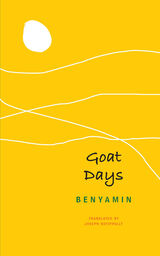
Goat Days
Benyamin
Seagull Books, 2016
Now in paperback, Benyamin's wry and tender telling transforms the strange and bitter comedy of Najeeb’s life in the desert into a universal tale of loneliness and alienation.
In the southern Indian state of Kerala, Najeeb’s dearest wish is to work in a Persian Gulf country and earn enough money to send some back home. One day, he finally achieves this dream, only to be propelled by a series of incidents—grim and absurd—into a slave-like existence, herding goats in the middle of the Saudi desert. Memories of his loving family and of the lush, verdant landscape of his village haunt Najeeb, whose only solace is the companionship of goats. In the end, the lonely young man is forced to contrive a hazardous scheme to escape his desert prison.
An instant bestseller in India, Goat Days is available for the first time in English, translated by Joseph Koyippally. Benyamin is a brilliant new talent of Malayalam literature and his wry and tender telling transforms the strange and bitter comedy of Najeeb’s life in the desert into a universal tale of loneliness and alienation.
In the southern Indian state of Kerala, Najeeb’s dearest wish is to work in a Persian Gulf country and earn enough money to send some back home. One day, he finally achieves this dream, only to be propelled by a series of incidents—grim and absurd—into a slave-like existence, herding goats in the middle of the Saudi desert. Memories of his loving family and of the lush, verdant landscape of his village haunt Najeeb, whose only solace is the companionship of goats. In the end, the lonely young man is forced to contrive a hazardous scheme to escape his desert prison.
An instant bestseller in India, Goat Days is available for the first time in English, translated by Joseph Koyippally. Benyamin is a brilliant new talent of Malayalam literature and his wry and tender telling transforms the strange and bitter comedy of Najeeb’s life in the desert into a universal tale of loneliness and alienation.
[more]
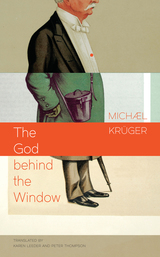
The God Behind the Window
Michael Krüger
Seagull Books, 2018
Now in paperback, a comic and moving collection of stories of grumpy old men who start to find unexpected connections with the world.
The thirteen stories of Michael Krüger’s The God behind the Window capture the poignancy and cynicism of late life through tales of misanthropic old men full of the mixture of wisdom and melancholy that so often accompanies old age. In Krüger’s stories, world-weary characters seek—and only temporarily find—solace in nature and culture, rendering their search for a better life simultaneously comedic and heart wrenching. From a solitary hiker in the Swiss Alps to the book’s eponymous shut-in, these aging malcontents are continually surprised by the unexpected interventions of a world that has come to seem predictable. Krüger captures this stage in life masterfully, contrasting the deeply personal emotions of affection, melancholy, and longing with an indifferent world. The resulting stories are lyrical, philosophical, and tender despite their cynicism.
The thirteen stories of Michael Krüger’s The God behind the Window capture the poignancy and cynicism of late life through tales of misanthropic old men full of the mixture of wisdom and melancholy that so often accompanies old age. In Krüger’s stories, world-weary characters seek—and only temporarily find—solace in nature and culture, rendering their search for a better life simultaneously comedic and heart wrenching. From a solitary hiker in the Swiss Alps to the book’s eponymous shut-in, these aging malcontents are continually surprised by the unexpected interventions of a world that has come to seem predictable. Krüger captures this stage in life masterfully, contrasting the deeply personal emotions of affection, melancholy, and longing with an indifferent world. The resulting stories are lyrical, philosophical, and tender despite their cynicism.
[more]

Goethe Dies
Thomas Bernhard
Seagull Books, 2019
This collection of four stories by the writer George Steiner called “one of the masters of European fiction” is, as longtime fans of Thomas Bernhard would expect, bleakly comic and inspiringly rancorous. The subject of his stories vary: in one, Goethe summons Wittgenstein to discuss the Tractatus Logico-Philosophicus; “Montaigne: A Story (in 22 Installments)” tells of a young man sealing himself in a tower to read; “Reunion,” meanwhile, satirizes that very impulse to escape; and the final story rounds out the collection by making Bernhard himself a victim, persecuted by his greatest enemy—his very homeland of Austria. Underpinning all these variously comic, tragic, and bitingly satirical excursions is Bernhard’s abiding interest in, and deep knowledge of, the philosophy of doubt.
Bernhard’s work can seem off-putting on first acquaintance, as he suffers no fools and offers no hand to assist the unwary reader. But those who make the effort to engage with Bernhard on his own uncompromising terms will discover a writer with powerful comic gifts, penetrating insight into the failings and delusions of modern life, and an unstinting desire to tell the whole, unvarnished, unwelcome truth. Start here, readers; the rewards are great.
Bernhard’s work can seem off-putting on first acquaintance, as he suffers no fools and offers no hand to assist the unwary reader. But those who make the effort to engage with Bernhard on his own uncompromising terms will discover a writer with powerful comic gifts, penetrating insight into the failings and delusions of modern life, and an unstinting desire to tell the whole, unvarnished, unwelcome truth. Start here, readers; the rewards are great.
[more]
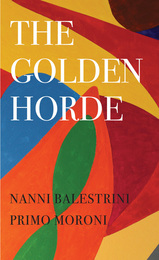
The Golden Horde
Revolutionary Italy, 1960–1977
Edited by Nanni Balestrini and Primo Moroni
Seagull Books, 2021
The Golden Horde is a definitive work on the Italian revolutionary movements of the 1960s and ’70s.
An anthology of texts and fragments woven together with an original commentary, The Golden Horde widens our understanding of the full complexity and richness of radical thought and practice in Italy during the 1960s and ’70s. The book covers the generational turbulence of Italy’s postwar period, the transformations of Italian capitalism, the new analyses by worker-focused intellectuals, the student movement of 1968, the Hot Autumn of 1969, the extra-parliamentary groups of the early 1970s, the Red Brigades, the formation of a radical women’s movement, the development of Autonomia, and the build-up to the watershed moment of the spontaneous political movement of 1977. Far from being merely a handbook of political history, The Golden Horde also sheds light on two decades of Italian culture, including the newspapers, songs, journals, festivals, comics, and philosophy that these movements produced. The book features writings by Sergio Bologna, Umberto Eco, Elvio Fachinelli, Lea Melandri, Danilo Montaldi, Toni Negri, Raniero Panzieri, Franco Piperno, Rossana Rossanda, Paolo Virno, and others, as well as an in-depth introduction by translator Richard Braude outlining the work’s composition and development.
An anthology of texts and fragments woven together with an original commentary, The Golden Horde widens our understanding of the full complexity and richness of radical thought and practice in Italy during the 1960s and ’70s. The book covers the generational turbulence of Italy’s postwar period, the transformations of Italian capitalism, the new analyses by worker-focused intellectuals, the student movement of 1968, the Hot Autumn of 1969, the extra-parliamentary groups of the early 1970s, the Red Brigades, the formation of a radical women’s movement, the development of Autonomia, and the build-up to the watershed moment of the spontaneous political movement of 1977. Far from being merely a handbook of political history, The Golden Horde also sheds light on two decades of Italian culture, including the newspapers, songs, journals, festivals, comics, and philosophy that these movements produced. The book features writings by Sergio Bologna, Umberto Eco, Elvio Fachinelli, Lea Melandri, Danilo Montaldi, Toni Negri, Raniero Panzieri, Franco Piperno, Rossana Rossanda, Paolo Virno, and others, as well as an in-depth introduction by translator Richard Braude outlining the work’s composition and development.
[more]

Gone But Not Forgotten
My Favourite Flops and Other Projects that Came to Nothing
Hans Magnus Enzensberger
Seagull Books, 2022
One of Germany’s greatest living writers offers up an analysis (and samples) of his failed projects.
“My dear fellow artists, whether writers, actors, painters, film-makers, singers, sculptors, or composers, why are you so reluctant to talk about your minor or major failures?” With that question, Hans Magnus Enzensberger—the most senior among Germany’s great writers—begins his amusing ruminations on his favorite projects that never saw the light of day. There is enlightenment in every embarrassing episode, he argues, and while artists tend to forget their successes quickly, the memory of a project that came to nothing stays in the mind for years, if not decades. Triumphs hold no lessons for us, but fiascos can extend our understanding, giving insight into the conditions of production, conventions, and practices of the industries concerned, and helping novices to assess the snares and minefields in the industry of their choice. What’s more, Enzensberger argues, flops have a therapeutic effect: They can cure, or at least alleviate, the vocational illnesses of authors, be it the loss of control or megalomania. In Gone but Not Forgotten, Enzensberger looks back at his uncompleted experiments not just in the world of books but also in cinema, theater, opera, and journal publishing, and shares with us a “store of ideas” teeming with sketches of still-possible projects. He also reflects on the likely reasons for these big and small defeats. Interspersed among his ruminations are excerpts from those experiments, giving readers a taste of what we missed. Together, the pieces in this volume build a remarkable picture of a versatile genius’s range of work over more than half a century and make us reflect on the very nature of success and failure by which we measure our lives.
“My dear fellow artists, whether writers, actors, painters, film-makers, singers, sculptors, or composers, why are you so reluctant to talk about your minor or major failures?” With that question, Hans Magnus Enzensberger—the most senior among Germany’s great writers—begins his amusing ruminations on his favorite projects that never saw the light of day. There is enlightenment in every embarrassing episode, he argues, and while artists tend to forget their successes quickly, the memory of a project that came to nothing stays in the mind for years, if not decades. Triumphs hold no lessons for us, but fiascos can extend our understanding, giving insight into the conditions of production, conventions, and practices of the industries concerned, and helping novices to assess the snares and minefields in the industry of their choice. What’s more, Enzensberger argues, flops have a therapeutic effect: They can cure, or at least alleviate, the vocational illnesses of authors, be it the loss of control or megalomania. In Gone but Not Forgotten, Enzensberger looks back at his uncompleted experiments not just in the world of books but also in cinema, theater, opera, and journal publishing, and shares with us a “store of ideas” teeming with sketches of still-possible projects. He also reflects on the likely reasons for these big and small defeats. Interspersed among his ruminations are excerpts from those experiments, giving readers a taste of what we missed. Together, the pieces in this volume build a remarkable picture of a versatile genius’s range of work over more than half a century and make us reflect on the very nature of success and failure by which we measure our lives.
[more]
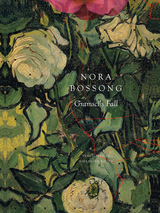
Gramsci’s Fall
Nora Bossong
Seagull Books, 2019
A novel at once about social justice, romance, and Gramsci.
Is it possible to fight for social justice if you’ve never really loved another person? Can you save a country if you’re in love? Forty-six-year-old Anton Stöver’s marriage is broken. His affairs are a thing of the past, and his career at the university has reached a dead end. One day he is offered the chance to go to Rome to conduct research on Antonio Gramsci, at one time the leading figure of Italian communism. Once there, he falls obsessively in love with a young woman he has met while continuing to focus his attention on the past: the frail and feverish Gramsci recovering in a Soviet sanatorium. Though Gramsci is supposed to save Italy from Mussolini’s seizure of power, he falls in love with a Russian comrade instead. With a subtle sense of the absurd, Nora Bossong explores the conflicts between having intense feelings for another and fighting for great ideals.
Is it possible to fight for social justice if you’ve never really loved another person? Can you save a country if you’re in love? Forty-six-year-old Anton Stöver’s marriage is broken. His affairs are a thing of the past, and his career at the university has reached a dead end. One day he is offered the chance to go to Rome to conduct research on Antonio Gramsci, at one time the leading figure of Italian communism. Once there, he falls obsessively in love with a young woman he has met while continuing to focus his attention on the past: the frail and feverish Gramsci recovering in a Soviet sanatorium. Though Gramsci is supposed to save Italy from Mussolini’s seizure of power, he falls in love with a Russian comrade instead. With a subtle sense of the absurd, Nora Bossong explores the conflicts between having intense feelings for another and fighting for great ideals.
[more]
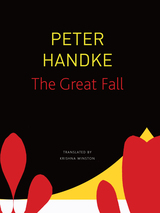
The Great Fall
Peter Handke
Seagull Books, 2018
“On the day of the Great Fall he left nothing, nothing at all behind.”
The latest work by Peter Handke, one of our greatest living writers, chronicles a day in life of an aging actor as he makes his way on foot from the outskirts of a great metropolis into its center. He is scheduled to receive a prestigious award that evening from the country’s president, and the following day he is supposed to start shooting for a film—perhaps his last—in which he plays a man who runs amok. While passing through a forest, he encounters the outcasts of the society—homeless people and migrants—but he keeps trudging along, traversing a suburb whose inhabitants are locked in petty but mortal conflicts, crossing a seemingly unbridgeable superhighway, and wandering into an abandoned railyard, where police, unused to pedestrians, detain him briefly on suspicion of terrorism.
Things don’t improve when he reaches the heart of the city. There he can’t help but see the alienation characteristic of its residents and the omnipresent malign influence of electronic technology. What, then, is the “Great Fall”? What is this heart-wrenching, humorous, distinctively attentive narrative trying to tell us? As usual, Peter Handke, deeply introspective and powerfully critical of the world around him, leaves it to the reader to figure out.
The latest work by Peter Handke, one of our greatest living writers, chronicles a day in life of an aging actor as he makes his way on foot from the outskirts of a great metropolis into its center. He is scheduled to receive a prestigious award that evening from the country’s president, and the following day he is supposed to start shooting for a film—perhaps his last—in which he plays a man who runs amok. While passing through a forest, he encounters the outcasts of the society—homeless people and migrants—but he keeps trudging along, traversing a suburb whose inhabitants are locked in petty but mortal conflicts, crossing a seemingly unbridgeable superhighway, and wandering into an abandoned railyard, where police, unused to pedestrians, detain him briefly on suspicion of terrorism.
Things don’t improve when he reaches the heart of the city. There he can’t help but see the alienation characteristic of its residents and the omnipresent malign influence of electronic technology. What, then, is the “Great Fall”? What is this heart-wrenching, humorous, distinctively attentive narrative trying to tell us? As usual, Peter Handke, deeply introspective and powerfully critical of the world around him, leaves it to the reader to figure out.
[more]
READERS
Browse our collection.
PUBLISHERS
See BiblioVault's publisher services.
STUDENT SERVICES
Files for college accessibility offices.
UChicago Accessibility Resources
home | accessibility | search | about | contact us
BiblioVault ® 2001 - 2024
The University of Chicago Press









